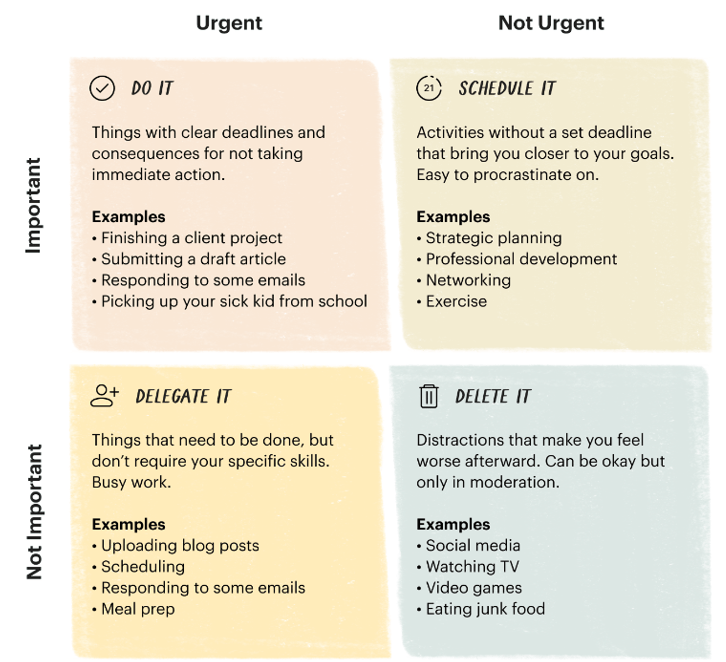Personal Development: How to use Time Management to increase your productivity.
When Time management is key to modern life, how do we implement it?
Let’s dive into the tools of Time management, what I recommend and what you can do straight away to gain the most benefit from it!
“Do or do not, there is no try” – Yoda

We all have someone at work who will say at least once “I haven’t got time” or “There’s not enough time in the day” or maybe you find yourself saying this to others. The truth is time is a resource we can never gain back once it is spent (so thanks in advance for your time here!), we all feel the pressure when there’s so much to get done that it’ll never be achieved. Today I want to talk about Time management and the research I did which lead me to a startling understand of what it’s all about.
I’ll be blunt, it’s never time that’s the issue but how we see and manage our priorities which causes time management issues, what we think is important and what actually is (except when the boss says it is then your choice is made). But I’m sure like me, people come up to you during the day needing help/advice/opinions and like myself you will help (it’s only human nature). Was it important? And if another department manager comes by with a request is that the priority??
Priority in Time management isn’t what you think it is.
First let’s tackle the issue of what is a priority? Now I love a good TED talk (going back to last months topic on mentoring, it’s another place to find experts that give you their opinions – for free), there is one in particular that I would like to share here that makes a particularly important definition on priorities –
Yeah, I know a bit extreme about the house flooding but it makes a clear point, in a crisis we know what the priorities are and can act accordingly, so why don’t we do the same thing for work or even in our home lives?
We aren’t Elon’s where we can block out our days into micro-5-minute tasks to do power work (he’s the exception), it would be nice jetting around the world solving problems but let’s just stick to where we currently are.
There are two schools of thought that I enjoy talking to others about, and they are:
- If you want something done, give it to a busy person.
- If you want something done, give it to a lazy person.
Did I just contradict myself? Well actually no, let me explain.
The first idea I came across in Bear Grylls guide to life, where he talks about a friend winning a once in a life time trip to Hawaii (lucky guy), but he can’t go unless he completes all his work as the tickets are for flights leaving the next day. So, within that time frame and crisis he manages to achieve 2 weeks work and gets to that holiday (I really need to re-read that because I’m not sure I remember it saying he took the family – joking).
The second comes from my own experience and works similar to a colleague of mine, why a lazy person? Because they will a way to achieve the work in the most efficient and low effort way (usually by automating the task, so work up front for long term pay off). Now this is covered in a way, in the book “4-hour work week” the author talks about his method of freeing people from the standard work day practice the 9 to 5, he goes through his Define/Elimination/Automate and Liberate method, it’s the automate where he talks about how to become more productive during your time working for home, but let’s spin this around and use the automate to become more productive at work. In many cases this automation is programming (VBA or others) spreadsheets to do the boring work of crunching numbers and to be fair this is what it should be doing, as in today’s world where resources are scarce we should be focusing our talents on the work decisions that need to be made, let the machine crunch the numbers and empower the shopfloor to collect data.
Hold that thought about automation, think about the Pareto principle and where 80% of your daily work goes into, this is what (if possible) you need to automate to free you up so the critical 20% can be worked on (the priority) – simple.
Making the most of Time management by using the Eisenhower matrix.
Ok so how do I start? How do I work out what the 80/20 split is? Ever heard of the Eisenhower matrix?

That illustration above is how I decide what my priorities are (again apart from being told by higher up). Let’s get to the point, here the idea is to focus on doing tasks that fall into the second box (important but not urgent), so box 4 you eliminate the task, 3 is delegated to others and 1 are the fires that you have to manage daily.
This leaves you to focus on box 2 which are tasks that will benefit the company / your project in the long term but needs your attention 80% of the time.
Using this tool in combination with a free online app called “Notion” to create a work breakdown structure (Habit 2 – Start with the end in mind) where I list the projects and the tasks required, next I use the matrix shown above to sort the tasks into their boxes to be dealt with (Habit 3 – Put first things first). Once that is done I can then proceed with boxes 1 & 2, how do I do this?
I’ve created my own log book page where I spend the first 10 minutes of my day writing down my projects (daily reminder – top 3) and the top 4 tasks I need to complete today in order to progress those projects above (these need to be done as your priority for the day).
A link to my page is PE Log Book – Web for you to download and use for yourself (no I’m not capturing emails), you’ll hopefully notice that I also mixed in some lean visual management with colours to denote the boxes of the Eisenhower matrix, so when tasks come up, I can assign them to the correct box, remember to allow the log page to work you need to focus on achieving those 4 tasks, so boxes 1 & 2 is where the busy man comes in.
Boxes 3 & 4 is the lazy man and where we’ve discussed learning to code. (Why learn to code?)
Summary
Time management is being productive but that’s just one thing, I don’t stress over being 100%, what concerns me is meaningful work and going home knowing that something was achieved today over nothing achieved is worth more, how about you?
Do I use this at home? No not really, the pace slows down but my hobbies and tasks are definitely meaningful. Keep it simple and please have a go at using my page and let me know how it goes.
Points
- It’s all about priorities (which can change)
- Start with the end in mind – what projects / tasks matter – Define / Eliminate / Automate & Liberate
- Put first things first – Work breakdown structure
- Manage your work and focus – Eisenhower matrix



What are your thoughts? Have I covered everything or is there more you know and would like to share?
I’m always learning and improving this site and my blogs, so please feel free to get in touch with me via LinkedIn or this site to discuss any topics I have covered.
If you’re having trouble finding ways to progress check out these sites filled with free learning tools:


Discover more from The Chartered Engineer
Subscribe to get the latest posts sent to your email.